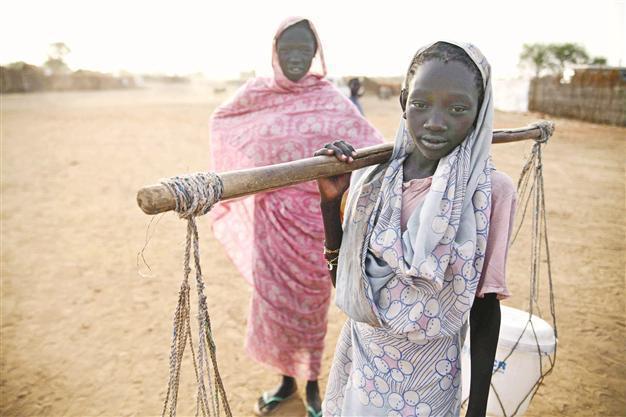Summit offers ground for dialogue, teamwork
Ekmeleddin Ihsanoğlu

A young girl carries empty jerry cans as she tries to fetch water in Jamam, South Sudan. Access to water and sanitation is a major problem in many African countries.
In 15 years, the Eurasian Economic Summit, which is annually organized by the Marmara Group Foundation, has emerged as an important platform for Public Private Dialogue on economic issues not only in Turkey, but also across the whole Eurasian region.A wide rage of participants at the Eurasian Economic Summit demonstrates the significance of this prestigious event to the efforts in defining and facilitating the implementation of an economic agenda that will help create an environment conducive to good governance, responsible private sector investment and sustainable private sector-driven economic growth and development in the Eurasian region.
The convening of this summit in Turkey is not a coincidence but rather the evidence of the growing role of this country in regional and global cooperation toward sustainable development and collective economic prosperity. It is in this context that I am pleased to note that Turkey in its capacity as the chairman of the OIC Standing Committee for Economic and Commercial Cooperation (COMCEC) has continued to extend all possible support to various initiatives of the OIC. This is evident from the numerous activities, which have continued to take place in Turkey under the sponsorship of the Turkish government, not only in the economic domain, but in the social, humanitarian, cultural and political spheres.
This occasion provides the opportunity to unveil the current socio-economic programs of the OIC, which are aimed at creating broader partnerships to promote trade and investment among its member states.
The current 57 OIC member states are dispersed over a large geographical region and spread out on four continents. The OIC countries account for one-sixth of the world’s area, more than one-fifth of the world’s total population, 60 percent of the world’s proven oil reserves, and 21 percent of the world’s arable land and agricultural resources. However, the OIC features countries at various stages of economic development. Twenty-one of them are listed as least developed countries, 18 are fuel-exporting developing countries, while the remaining 18 constitute developing countries.
Since the beginning of its 10-Year Program of Action in 2005, the OIC has been preoccupied with the elaboration of the enabling legislations to promote intra-OIC trade and investment. The Trade Preferential System of OIC (TPS-OIC), which includes a framework agreement, protocol and rules of origin, has since entered into force. It is noteworthy that although the contribution of OIC member states to world trade stood at $3.2 trillion in 2010, which is 10 percent of global merchandise trade, intra-OIC trade has increased from 14.4 percent in 2004 ($205 billion) to 17 percent in 2010 ($539 billion). It is my belief that the aforementioned trade facilitation mechanism, coupled with the trade financing activities of the various OIC institutions, will enable us to reach the target of attaining an intra-OIC trade rate of 20 percent by 2015.
The establishment of the two special programs dedicated to the development of Africa and Central Asia, respectively, has made it possible for members of the OIC to transfer their knowledge and share experiences, as well as to channel their support toward addressing the developmental challenges of OIC member states in these regions.
It is worth mentioning that under the OIC Special Program for the Development of Africa, a total value of $3.98 billion has been disbursed by the IDB Group for the financing of 364 projects in OIC African member states, especially those in Sub-Saharan Africa. The majority of the projects were in the area of promoting agricultural development and food security, access to water and sanitation, power generation, development of transport infrastructure, human resource development and combating communicable diseases. Additionally, an amount of $3.99 billion has also been mobilized through co-financing and public-private partnerships for these projects.
In the same vein and within the framework of the OIC Plan of Action for Cooperation with Central Asia, a number of projects have been identified, and they are presently being implemented.
Using this approach, the OIC is committed to expanding and deepening partnership and collaboration with other international organizations and multilateral development institutions, including civil society organizations which are attending this summit.
Ekmeleddin Ihsanoğlu is the Secretary General of the OIC. He will deliver an opening speech at the Intercultural Dialogue session at 2 pm today.
















